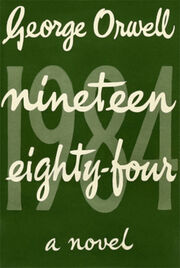A conspiracy theory is a term conspiriologists, academics who study the science of conspiracy, coined as the proposed explanation of a cover-up, covert operation, or secret plot, plan, or agenda to explain a mystery or unexplained event or situation. Conspiracy researchers seek to identify those who they believe are conspiring against the common people, typically those who are big corporations or big government.
History[]

Fears of a totalitarian state is one of the major drives of conspiracy theory. English writer George Orwell published Nineteen Eighty-Four in June 1949, which addressed a world fallen victim to perpetual war, omnipresent government surveillance, historical negationism and propaganda. Orwell’s works were based on his awareness of social injustice, opposition to totalitarianism, and outspoken support of democratic socialism.[1][2][3]
The concept of “Big Brother” derives from Orwell’s novel Nineteen Eighty-Four. Big Brother is a fictional character as leader of Oceania in a totalitarian state. In modern culture, the term "Big Brother" has often been conveyed as being synonymous with the abuse of government power, particularly in respect to civil liberties, and often specifically related to mass surveillance.[4]
Criticism[]
Conspiracy theories are often founded in conjecture of alleged motives for an event or situation surrounded in circumstantial or limited substantial evidence, even after final rulings. Skeptics and some academia who have attempted to understand the nature of conspiratorial behaviour have classified the study of conspiracy as conspiriology. However, the terms conspiriology and conspiriologist are not widely used, and the terms are rather in the urban sense.[5] Conspiracy theorists do not consider themselves to be conspiriologists, or follow any laws of conspiracy.
See also[]
References[]
- ↑ "Why I Write" in The Collected Essays, Journalism and Letters of George Orwell Volume 1: An Age Like This 1945–1950 p. 23. (Penguin)
- ↑ Orwell, George (1968) [1958]. Bott, George. ed. Selected Writings. London: Heinemann. p. 103. ISBN 978-0435136758. "Every line of serious work that I have written since 1936 has been written, directly or indirectly, against totalitarianism and for democratic socialism, as I understand it. [italics in original]"
- ↑ Gale, Steven H. (1996). Encyclopedia of British Humorists: Geoffrey Chaucer to John Cleese, Volume 1. Taylor & Francis. p. 823.
- ↑ Wikipedia, Big Brother (Nineteen Eighty-Four)
- ↑ Urban Dictionary, Conspirology
